|
|
|
Sort Order |
|
|
|
Items / Page
|
|
|
|
|
|
|
| Srl | Item |
| 1 |
ID:
192142
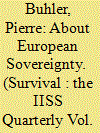

|
|
|
|
|
| Summary/Abstract |
The coining of the concept of ‘European sovereignty’ by French President Emmanuel Macron in 2017 has prompted a heated debate, reviving disputes over supranationality, the nation-state and democracy that have resonated since the inception of the European project. Macron’s intervention came at a time when a flurry of crises compelled the European Union to move from its ambition of being a ‘normative power’ to living through its ‘Machiavellian moment’, against the backdrop of the rise of new global powers and existential threats for the security of the Union and its member states. But the term ‘European sovereignty’ is a misnomer. The real issue is one of power, not of sovereignty. Power proceeds from command, hardly an attribute of the complex shared decision-making process of the EU, leaving the objective of becoming a fully-fledged power out of reach for the European polity.
|
|
|
|
|
|
|
|
|
|
|
|
|
|
|
|
| 2 |
ID:
192141
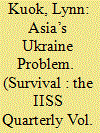

|
|
|
|
|
| Summary/Abstract |
Many Asian governments regard Russia’s war with Ukraine as a distant event with limited impact on the region, beyond rising food and energy prices and possibly increasing the risk of China attacking Taiwan. But the war has strained the rule of law and is entrenching ideological divisions, introducing unnecessary complexity into alliances and partnerships. Asian governments should be alert to the negative implications of these developments for regional peace and security. For them to condemn Russia’s invasion of Ukraine and defend the rule of law would not be to blindly support the West, and would be entirely consistent with their national interests. The West, for its part, should avoid worsening geopolitical fault lines. To this end, the United States might refrain from characterising great-power competition as a battle between autocracies and democracies, and from painting China and Russia with the same broad ideological brush.
|
|
|
|
|
|
|
|
|
|
|
|
|
|
|
|
| 3 |
ID:
192146
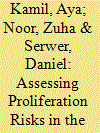

|
|
|
|
|
| Summary/Abstract |
Whether the Iran nuclear deal rises from the ashes or not, the United States and Europe now need to focus on preventing a nuclear arms race in the Middle East. Turkiye and Saudi Arabia are the most likely to respond to Iran’s becoming a nuclear-threshold state. Both have good reasons to think twice before proceeding, but their current leaders have made statements that arouse concern. Egypt might find it hard not to follow in their wake. With Israel and Iran, there would then be a prospect of five rivalrous nuclear powers in close proximity in a volatile region. Avoiding this scenario will require careful analysis of nuclear capabilities in the potential proliferating states; intense diplomacy among the US, Europe and the potential proliferators; and a broader regional-security framework for threat assessment that does not exist today.
|
|
|
|
|
|
|
|
|
|
|
|
|
|
|
|
| 4 |
ID:
192143
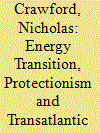

|
|
|
|
|
| Summary/Abstract |
US President Joe Biden has worked to repair the damage done to the transatlantic relationship by his predecessor, quickly realigning the United States with Europe on issues of energy and climate change. However, the US Inflation Reduction Act (IRA) of 2022 introduced a raft of protectionist subsidies for US clean-energy industries and reignited tensions between the US and the European Union. The EU has warned that the IRA could damage the bloc’s industry and American critics suggest the act may trigger a new US–EU trade war. The Biden administration’s geopolitical internationalism is at odds with its geo-economic nationalism. The fact remains, however, that Europe is unlikely to be severely affected by the IRA. Moreover, European political leaders have threatened more aggressive responses to the IRA than they can deliver. A trade war is unlikely. It is more likely that booming green industries in the EU and US will open new avenues to cooperation between them.
|
|
|
|
|
|
|
|
|
|
|
|
|
|
|
|
| 5 |
ID:
192139
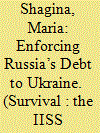

|
|
|
|
|
| Summary/Abstract |
As Russia continues to wage war against Ukraine, Western calls to confiscate Russian frozen assets to aid Ukraine’s reconstruction have become more urgent. Whether justice on this score will be ultimately delivered remains unclear. Despite many international initiatives to seize Russian assets, legal conservatism and concerns over the disruption of international rules are strong constraints. Finding a legal way to confiscate Russian sovereign assets will require political determination, international coordination and legal creativity.
|
|
|
|
|
|
|
|
|
|
|
|
|
|
|
|
| 6 |
ID:
192138
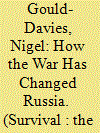

|
|
|
|
|
| Summary/Abstract |
Russia’s war in Ukraine is changing Russia itself. It is subordinating stability and prosperity to geopolitical obsession, and is mobilising society around active support for costly, indefinite aggression. This is breaking stabilising bargains the regime has struck at home with elites and the wider population. The system is not yet close to crisis, but the strains it faces will deepen.
|
|
|
|
|
|
|
|
|
|
|
|
|
|
|
|
| 7 |
ID:
192144


|
|
|
|
|
| Summary/Abstract |
US President Joe Biden’s foreign policy, as expressed in the 2022 National Security Strategy, represents a contemporary variation of the Truman Doctrine, the Marshall Plan and the post-Second World War programme of US global leadership. It frames great-power politics in the international arena and democratic revitalisation at home as part of a broad ideological confrontation between liberal-democratic capitalism and illiberal, authoritarian nationalism. It directs an economic-recovery plan inward to rebuild the US economy after the distortions it has been experiencing since 2008. And it promotes US leadership of the liberal-international order, albeit in a different geopolitical environment than prevailed in the post-war years. This strategy has been refined in the face of near disaster and revived by the Russian invasion of Ukraine in February 2022.
|
|
|
|
|
|
|
|
|
|
|
|
|
|
|
|
| 8 |
ID:
192137


|
|
|
|
|
| Summary/Abstract |
Attrition has been both Ukraine’s and Russia’s primary approach at the tactical level. Ukraine’s preferred way of war centres on the use of artillery fire to facilitate decisive attritional effects on the opposing force, which it then exploits with manoeuvre. This is not unexpected, as most major conventional wars feature attrition as well as manoeuvre and reconstitution. Western assistance has brought Ukraine to an impressive point, but may not yield a fires advantage for Ukraine sufficient to ensure further operational breakthroughs or strategic gains. Advanced Western weapons, such as the US-supplied High Mobility Artillery Rocket System (HIMARS), have not allowed Ukraine to avoid attritional combat, particularly in its counter-offensive in Kherson. Even with more effective wide-scale combined-arms training and precision strikes, as contemplated, future Ukrainian gains are likely to be incremental and costly unless the Russian military significantly misspends combat power in its own offensive operations.
|
|
|
|
|
|
|
|
|
|
|
|
|
|
|
|
| 9 |
ID:
192145
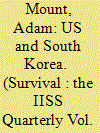

|
|
|
|
|
| Summary/Abstract |
As US officials have grown more anxious about the credibility of extended nuclear deterrence, they have placed renewed emphasis on nuclear-assurance measures. The hope is that closer exercises and consultations can reassure allies, strengthen deterrence postures and reduce the risk that an ally could pursue their own nuclear weapons. However, recent developments in the US–South Korea alliance suggest that nuclear assurance is not only ineffective at reassuring Seoul but may also be fuelling proliferation risks. By raising the salience of nuclear weapons within the alliance, nuclear assurance reinforces the fiction that South Korea’s defence depends on nuclear use. Misunderstanding the risks and potential of nuclear assurance has fuelled calls for a South Korean nuclear-weapons programme and obstructed the alliance’s ability to adapt and improve its deterrence posture.
|
|
|
|
|
|
|
|
|
|
|
|
|
|
|
|
| 10 |
ID:
192140
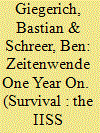

|
|
|
|
|
| Summary/Abstract |
In response to Russia’s invasion of Ukraine on 24 February 2022, German Chancellor Olaf Scholz announced a Zeitenwende, or historical turning point, for German foreign and defence policy. Expectations of profound German geopolitical, geostrategic and geo-economic transformation were raised both in Germany and among Berlin’s allies. One year later, Germany’s greatest success has come in the geo-economic arena, where progress has been made to reduce Germany’s energy imports from Russia. Geopolitically, the picture is less convincing. While Scholz has committed to the defence of NATO territory against potential Russian aggression, it is not obvious whether the German government really perceives Russia as a direct threat to the country. Berlin has yet to formulate a convincing geopolitical leadership role in Europe, and it remains to be seen if the new defence minister, Boris Pistorius, will succeed in giving shape to much-needed Bundeswehr reform and resolve major readiness and procurement challenges. Consistent pressure from NATO allies will be needed to help bring about major change to Germany’s strategic and defence policy.
|
|
|
|
|
|
|
|
|
|
|
|
|
|
|
|
|
|
|
|
|